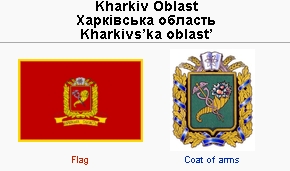Difference between revisions of "Kharkov (Ukraine)"
| [checked revision] | [checked revision] |
m (Text replace - "Karlsruhe; Schneider, 1913-1967: v. I" to "Karlsruhe: Schneider, 1913-1967: v. I") |
m (Added categories) |
||
| Line 11: | Line 11: | ||
Hege, Christian and Christian Neff. <em>Mennonitisches Lexikon</em>, 4 vols. Frankfurt & Weierhof: Hege; Karlsruhe: Schneider, 1913-1967: v. I, 339. | Hege, Christian and Christian Neff. <em>Mennonitisches Lexikon</em>, 4 vols. Frankfurt & Weierhof: Hege; Karlsruhe: Schneider, 1913-1967: v. I, 339. | ||
{{GAMEO_footer|hp=Vol. 3, p. 172|date=1957|a1_last=Bergmann|a1_first=Cornelius|a2_last= |a2_first= }} | {{GAMEO_footer|hp=Vol. 3, p. 172|date=1957|a1_last=Bergmann|a1_first=Cornelius|a2_last= |a2_first= }} | ||
| + | [[Category:Places]] | ||
| + | [[Category:Cities, Towns, and Villages]] | ||
| + | [[Category:Cities, Towns, and Villages in Ukraine]] | ||
Revision as of 03:17, 15 July 2016


Kharkov (Kharkiv) is a province (oblast) and city in the Ukraine. The province has an area of 12,000 square miles and population of 2,847,751 as of 2004 (2,500,000 in 1946). According to the evaluation of 1909 there were in the province of Kharkov, especially in the district of Izyum, 1,386 settlers of Mennonite origin, divided in two groups of colonies, Naumenko and Zamoilovka. The valuation amounted to over 10 million rubles.
The Naumenko settlement (established in 1889) was grouped around the station of Barvenkovo of the Lozovaya-Rostov Railway. It included the villages of Grigoryevka, Petrovka, Elenovka, Vassilyevka, and the factory and mill owners in Barvenkovo. Their founders emigrated from the Mennonite Brethren group at Einlage (Kitchkas), and their villages formed a subsidiary of that church. An exception was Grigoryevka, which was composed of settlers from New York, the Chortitza daughter settlement. The individual settlements had good school buildings, and Barvenkovo had a school of commerce supported principally by Mennonites. There were Mennonite Brethren church buildings in Barvenkovo and Petrovka. Inadequate connections with the mother colony, together with economic deterioration caused some loss of religious and intellectual life. Sharp opposition to the local authorities and to the Mennonites at first had an unfavourable effect. The group had about 16,200 acres of land, besides important industrial establishments, and numbered over 600 souls.
The second group, Zamoilovka, near Bachmetyevka was founded by emigrants from the Molotschna and consisted of several villages founded in 1888 and after. They were Zamoilovka, Shostakovo, Novo-Stepeno, Ryskovo, etc. The villages were laid out on land which they had bought.
Besides these villages there were several settlements of German Lutherans (Elizavetovka near Barvenkovo, Ivanovka, etc.) and Baptists.
After the Russian Revolution there were Mennonite students attending the schools of higher learning in the city of Kharkov. After 1922 the Verband der Bürger holländischer Herkunft had its headquarters in Kharkov.
Bibliography
Hege, Christian and Christian Neff. Mennonitisches Lexikon, 4 vols. Frankfurt & Weierhof: Hege; Karlsruhe: Schneider, 1913-1967: v. I, 339.
| Author(s) | Cornelius Bergmann |
|---|---|
| Date Published | 1957 |
Cite This Article
MLA style
Bergmann, Cornelius. "Kharkov (Ukraine)." Global Anabaptist Mennonite Encyclopedia Online. 1957. Web. 2 Feb 2026. https://gameo.org/index.php?title=Kharkov_(Ukraine)&oldid=135049.
APA style
Bergmann, Cornelius. (1957). Kharkov (Ukraine). Global Anabaptist Mennonite Encyclopedia Online. Retrieved 2 February 2026, from https://gameo.org/index.php?title=Kharkov_(Ukraine)&oldid=135049.
Adapted by permission of Herald Press, Harrisonburg, Virginia, from Mennonite Encyclopedia, Vol. 3, p. 172. All rights reserved.
©1996-2026 by the Global Anabaptist Mennonite Encyclopedia Online. All rights reserved.
